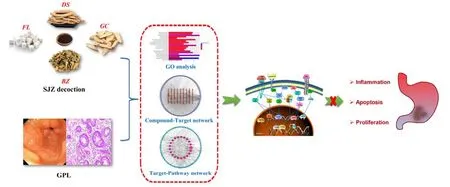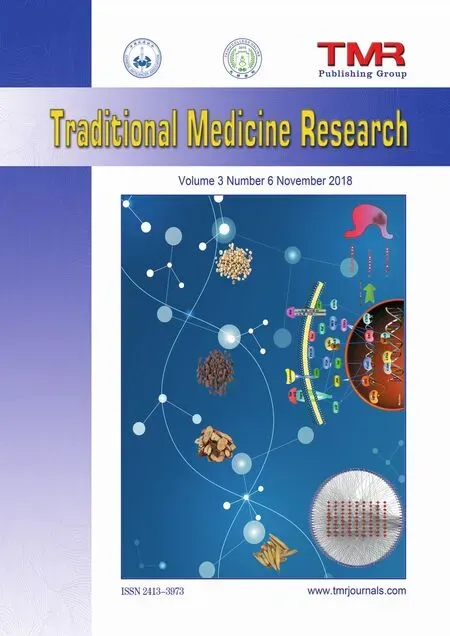The role of Si-Jun-Zi decoction in the management of gastric precancerous lesions and its mechanism

Gastric cancer remains one of the most common and aggressive malignant tumors worldwide. The occurence of gastric cancer experiences a cascade of multistep gastric carcinogenesis, starting from inflammation,metaplasia, and ultimately to dysplasia and carcinoma.Patients with gastric precancerous lesions, mainly including intestinal metaplasia and dysplasia, are more prone to suffer from gastric adenocarcinoma [1].Therefore, early prevention and treatment regarding gastric precancerous lesions is an important way to reduce the risk of occurence of gastric cancer.
At present, the therapy of gastric precancerous lesions main contains H. pylori eradication, the application of cyclooxgenase-2 (COX-2) inhibitor or antioxidants,and/or endoscopic mucosal resection. However, their clinical outcome is limited because they does not appear to reverse intestinal metaplasia but may only slow down the progression to neoplasia [2, 3]. In most cases, “wait and see” strategy, that is, survailing or monitoring the progression of precancerous conditions and lesions,remains the most important guidline in the management of gastric precancerous lesions.
Si-Jun-Zi (SJZ) decoction, a famous herbal formula originated from Chinese medicine ancient book Taiping Huimin Heji Jufang in 1078 A.D. - 1085 A.D., Song Dynasty of China, has been used to treat digestive diseases for hundreds of years. Clinical studies showed that SJZ decoction could reverse gastric precancerous lesions and had the potential to prevent gastic cancer[4-6]. Due to its multi-compound and multi-target manner,SJZ decoction shows great potential in the prevention of this complex disease. However, at present, the active components and the mechanism of its favorably therapeutic effects, especially the mechanisam from
In recent years network pharmacology has become a popular methodology for the reasearch of Chinese herbal formular. The network pharmacology approach could provide a novel approach for thoroughly exploring the active components and molecular mechanisms underlying the therapeutic effects of Chinese herbal formular with the aid of Big Database, including the active compounds screening, compound targets of herbal formular, disease targets of GPL, GO and KEGG pathway enrichment and network construction.
To read more about Si-Jun-Zi decoction, see this artical please: A network pharmacology approach to investigate the mechanisms of Si-Jun-Zi decoction in the treatment of gastric precancerous lesions. Link:https://www.tmrjournals.com/tmr/EN/10.12032/TMR201 814087
Xiong-Zhi Wu
Editor-in-Chief of TMR
1. de Vries AC, van Grieken NC, Looman CW, et al.Gastric cancer risk in patients with premalignant gastric lesions: a nationwide cohort study in the Netherlands. Gastroenterology 2008, 134: 945-952.
2. Dinis-Ribeiro M, Areia M, de Vries AC, et al.Management of precancerous conditions and lesions in the stomach (MAPS): guideline from the European Society of Gastrointestinal Endoscopy(ESGE), European Helicobacter Study Group(EHSG), European Society of Pathology (ESP), and the Sociedade Portuguesa de Endoscopia Digestiva(SPED). Endoscopy 2012, 44: 74-94.
3. Huh CW, Kim BW. Endoscopic treatment of gastric adenoma. Korean J Gastroenterol 2017, 70: 115-120.
4. Song FL, Lin YF, Li HR. Effect of Jiawei Sijunzi decoction based triple therapy on atrophic gastritis and expression of PCNA. China J Trad Chin Med Pharm 2009, 4: 367-369.
5. Ss ZN, Wang ZF, Luo XM. Meta-analysis of modified Sijunzi Tang for treating chronic atrophic gastritis. Chin J Exp Tradi Med Formulae 2015, 21:204-208.
6. Tang RY, Lin J. Status of clinical studies on treating precancerous lesions of gastric cancer with Chinese herbs. Trad Chin Med 2014, 3: 79-84.
 Traditional Medicine Research2018年6期
Traditional Medicine Research2018年6期
- Traditional Medicine Research的其它文章
- Recent advances in network pharmacology applications in Chinese herbal medicine
- A network pharmacology approach to investigate the mechanisms of Si-Jun-Zi decoction in the treatment of gastric precancerous lesions
- Analysis of the action mechanism of Fang Ji Huang Qi decoction in treating rheumatoid arthritis by network pharmacology
- Network pharmacology-based approach to investigate the mechanisms of Yiyi Fuzi Baijiang Powder in the treatment of malignant tumors
- Camel milk could be helpful in the treatment of asthma
